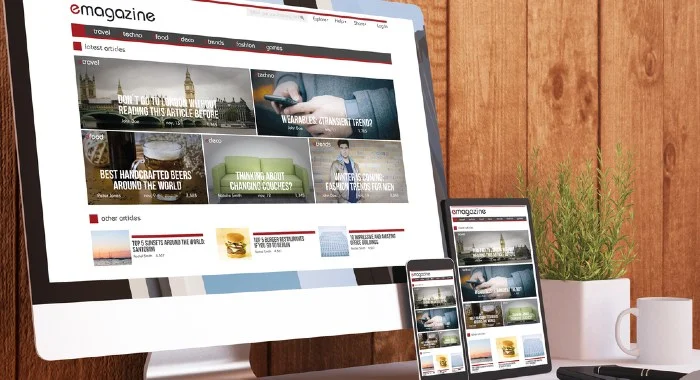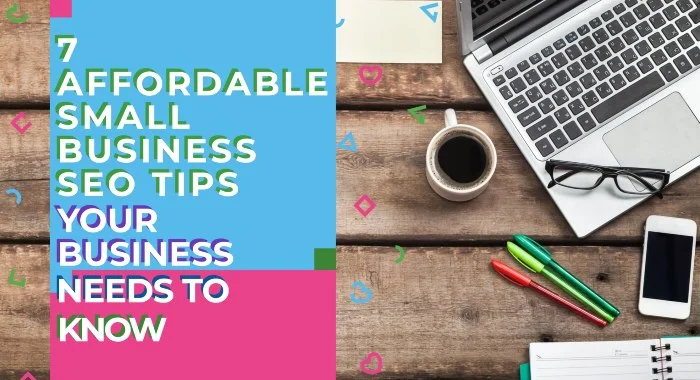SEO is becoming less of an option for small businesses, and more of a necessity for helping your business thrive online.
If you need any convincing, just remember that 97% of all consumers search online for the products or services that they need before actually making the purchase. If your business doesn’t come up in the search results, you’re missing out on these sales.
But, that doesn’t mean you need to hire an SEO agency or consultant. A lot of SEO tactics can be done yourself, without a big price tag attached.
Ready to discover the affordable small business SEO tips to help your business get found online?
Let’s begin.
What is SEO?
SEO stands for Search Engine Optimisation. It’s basically a strategy to help your business get ranked higher on search engines like Google.
Think of search engines like a giant library. They have thousands of books (or websites) and need a way to organise them and understand what content is inside. That way when someone comes to the library and asks for a specific book or topic, the library knows exactly which books to show them.
Websites are incredibly diverse, and just organising them by name doesn’t cut it. After all, the website ‘www.playfulkittens.com’ could be about really cute cats, or it could be something much more adult entirely.
It’s very important that search engines like Google know what websites they’re sending out to people. But more importantly, they want to make sure that the good websites are sending out first. That’s why they developed a very complex algorithm that judges the context and quality of a website.
Recommended SEO Tool:
If you’re a small business that wants to make SEO simple, we recommend using Hike SEO.
Their platform provides easy-to-follow step-by-step instructions that are fully customised to your goals and your website. You can even adjust how much time you want to spend on SEO month.
It’s by far the best SEO tool we have seen for time-poor business owners on a tight budget.
Click here to read our full review
SEO tactics make sure that your website works well with this algorithm, moving your website up the search engine results. The higher your website is, the more traffic you’ll get. That means more sales and time and effort well invested for you.
SEO doesn’t have to be expensive, especially for small businesses. That’s why we put together a list of 7 affordable SEO tips for small businesses that you can implement today.
Lost the buzz for your business?
Starting a business is exciting. Succeeding is rewarding. The bit between is hard, repetitive, and full of self-doubt.
The Lonely Middle Club (From Business4Beginners) helps you through it:
Get support and advice from other small business owners
Remove the self-doubt that’s holding your business back
Learn techniques and strategies to grow your business faster
Be inspired with our exclusive ‘swipe’ file and AI-powered tools
No pressure – work at YOUR pace, towards YOUR goals
—
The top 7 affordable small business SEO tips

Ready to take the plunge into the world of SEO? These tips can be implemented quickly and easily, starting today. All they need is a little bit of time and effort.
1. Create a Google My Business listing
Ever searched for a business on Google and seen that box that tells people extra information about the business? That’s a Google My Business listing.
You can get one for your business by signing up to the platform and inputting your own data. What’s more, it’s 100% free.
Once set up, it will list information such as:
- Your location
- Website
- Opening hours
- Phone number
- Photos
- Menu
- Customer Reviews
All of this information will stand out in a feature box on the search results pages, making it an eyecatching way to get your business noticed. What’s more, it will also include quick action buttons, allowing customers to call your business or even place a booking through the search engine.
As well as creating this account, it’s essential that you keep the information on it up-to-date. Any inconsistencies will decrease the chances of this showing to users.
If you can, it’s also a good idea to add several, high-quality images to the listing to further capture attention and make use of the Q&A feature. This is where Google can show FAQ (Frequency Asked Questions) and your responses to them.
You don’t have to wait until a customer asks you a question with the Q&A feature either. You can create a mini-FAQ by posting common questions yourself.
2. Pick relevant keywords to target

Keywords are the bricks that you build your SEO strategies from.
They are the terms that you want your business to come up for when someone searches for them. For example, if someone searches for “custom art prints” and that’s a product you offer, you’ll want to be targeting that keyword to appear in the search results.
To get the best keywords, they need to be relevant to your business. But if you want the best results, there’s also a few more bits of information that you need to gather.
This is:
- The monthly search volume, which shows an average of how many times the keyword is searched every month.
- The keyword trend, which shows how popular this term is over a period of time. I.e. ‘Novelty socks’ might be more popular over Christmas than in summer.
- Keyword difficulty, which is a measure of how difficult it is to rank for that keyword. Generally, the more businesses targeting it, the harder it will be to rank.
When picking the keywords, you ideally want ones that have a high search volume, a positive trend, and are low difficulty. That’s not always possible though, so it might be best for small businesses to start with low difficulty keywords with less search volume to start building your site up.
To get this data, there are a number of free tools that you can use, including:
Once you’ve got your list of keywords, it’s time to move onto the next step.
3. Keep your website updated with new content
Search engines like websites that regularly publish new content. That doesn’t mean you have to redesign your website every 2 weeks, but it’s a good idea to start a blog if you haven’t got one already.
The blogs you write should target the keywords that you’ve already come up with. For example, if you decide to target the keyword ‘pottery painting’, you might want to come up with blogs like:
- Why pottery painting is a great day out for kids
- 5 pottery painting tips to know before you visit
- How much does pottery painting cost?
If you’re stuck for ideas, try dropping your keyword into websites like Answer the Public, which come up with a list of questions related to your keyword.
Alternatively, you can use programmes like Frase, which will scan the web for your keyword, pulling relevant examples, questions, and statistics to get you started. It’s a great program that we’ve rated 9.7/10 in our review.
4. Create guest blog posts on other websites

From the whole list, this might be the least affordable small business SEO tip, but still, can be done!
As well as creating content for your own websites, you will want to consider writing guest posts on other websites. This is a great way to raise brand awareness by posting your brand in front of a different audience.
For your SEO, guest blog posts are great because they provide backlinks to your website. And boy, search engines love backlinks. The more backlinks you can get from quality websites, the more search engines see your website as an industry leader. This means higher rankings for you.
If writing isn’t your speciality, you can outsource this to freelancers. There are great platforms that you can find content writers on, including FatJoe which runs on a pay-as-you-go basis. Find out more about FatJoe in our review here.
5. Ask for reviews
Customer reviews are a great trust-building tool for your business. If a customer isn’t sure about your business, it’s the reviews they’ll go to put their mind at ease.
But reviews can also have positive effects on your SEO. For example, if you have a lot of Google reviews, these will show in your Google My Business listing and increase your chances of being shown.
If you want more reviews, ask for them. If someone buys from you, send them an email asking to review their purchase. If you run a restaurant, get your servers to ask customers to review their meal when they get home.
This is a really affordable SEO technique as you can put review links on receipts, social media, emails, business cards, or more. However, you want to do it, get your customers to review.
6. Take a look at your on-page SEO
This is where things get a little more technical. But before you start to panic, these on-page SEO changes are simple and quick to do.
Think of optimising your on-page SEO as a mini-checklist. These are things search engines like you to do so they can find your content quicker. Doing them puts your website in better favour, increasing your chances of ranking.
They include:
Optimising your URLs
Rather than having a really long and complex URL, you’ll want to change this into a simple, concise URL that search engines can use to get an idea of what’s on the page.
So, instead of: www.example.com/blog/284683/3jf-cats-unicorn-4848-rfg
Try: www.example.com/blog/cats-wearing-unicorn-hats
Use headings

Headings are a way for users & search engines to scan your content. You’ll want to include an H1 tag as the title of your page, and a couple of H2-H3 tags to create subheaders. Bonus points if you can use your keyword in one of your headings.
Add alt text to images
Alt text is written descriptions of an image. These are useful to search engines to understand what image you’ve put on the page, as they can’t see the image. It’s also useful to people who might be using a screen reader on your website.
Use links
Search engines love links. So, make sure that you’re linking to other websites AND other pages on your own website within the content. If you want an idea of how this may look like, take a look at the links we’ve included in this post.
See, that technical stuff isn’t so complicated is it?
7. Get listed on online directories
For our last tip, we will talk about something you can relate to.
Remember the yellow pages? They were a physical directory of businesses. Whenever someone needed service, they would open the book to the right section and give one of the businesses listed a call.
The yellow pages don’t exist any more, but online directories do. These are lists of businesses for a particular niche, industry, or area.
Getting your business listed on reputable directories shows to that audience that you can be trusted. It promotes your business to people who might not have heard of you, and it gives you extra backlinks for your SEO strategy to push your website through the rankings.
That’s a win-win.
If you can include ratings on directories, then combine this with tip number 5 and ask for reviews on this platform. This will help build your trust on the website, hopefully earning you new customers at the same time.
How long will it take to see SEO results?

Here’s the bad news: while this SEO strategy is affordable, it can take a long time to see the results of your efforts. But that doesn’t mean you should give up on it, as the long-term benefits are always worth the effort.
Think of SEO as planting seeds. You’ve got to give them time to grow before you can harvest the rewards.
Should I use PPC instead of SEO?
Businesses don’t have to choose between PPC and SEO. Using the two together is a way to catch all kinds of users, bringing more people to your website.
SEO involves time and effort, but a lot less investment than PPC. However, PPC can give your business instant results, as it will create ads that are shown at the top of the search result pages right away.
You can get more information on how PPC and SEO work together, and which strategy is right for your business here.
See your results from these affordable SEO tips
Now you know these affordable small business SEO tips, the next step is to implement them and see what effect they’ll have on your SEO.
Don’t forget, we recommend Hike SEO for small businesses who want to implement SEO in the most efficient and stress-free way as possible.
If you want to use more advanced tools, you might want to consider signing up for tools like SEMrush, Moz, or Ahrefs to monitor your success. Alternatively, keep an eye on your Google Analytics account to see if you’re bringing in new traffic and where they’re coming from.
Looking for more tips on how to market and build your online business?
We’ve got you covered. Take a look at our free guides, expert tips, and inspiration here.







